Show trials in the Russian Federation
Mikhail Khodorkovsky and Platon Lebedev
As a president, Putin would soon show that he had not forgotten about the working methods of the good old KGB. The most notable examples are the lawsuits against Mikhail Borisovich Khodorkovsky (°1963) and Platon Leonidovich Lebedev (°1956), the former owners of the oil company Yukos. Khodorkovsky was a successful business man and known by his criticism of corruption in the Russian politics, and also by his commitment to openness with his movement Открытая Россия [Otkrytaya Rossiya] or Open Russia, and by his support to opposition parties.
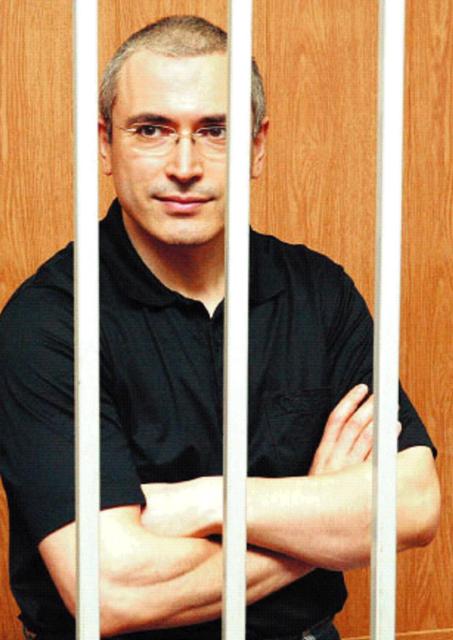
Mikhail Khodorkovsky
In February 2003, at a televised meeting at the Kremlin, Khodorkovsky argued with Putin about corruption. He implied that major government officials were accepting millions in bribes and displayed a PowerPoint presentation illustrating the costs of corruption to the Russian economy. On October 25, Khodorkovsky and Lebedev were arrested on suspicion of tax evasion, fraud and embezzlement. Yukos got completely dismantled, and the most profitable parts were given to Rosneft, an oil company run by Igor Ivanovich Sechin (°1960). Sechin is a former KGB spy and one of the most conservative advisors of Putin. He was Deputy Prime Minister in the cabinet of Putin and leader of the Комманда Силовиков [Kommanda Silovikov] or The Men of Power, a lobby of former KGB agents, and thus friends of Putin, in the Kremlin.
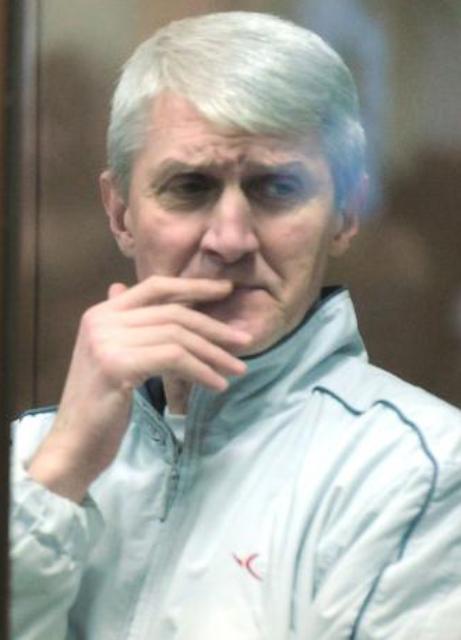
Platon Lebedev
In an attempt to reduce the public interest for the trial, it was held in the less significant Meshchansky district court in Moscow. Behind the scenes, however, the Kremlin and the Moscow City Court, the supreme court of the city of Moscow, played a guiding role. On May 31, 2005, Khodorkovsky and Lebedev were convicted for tax evasion and fraud to 9 years of imprisonment. On September 22, 2005, in a session of one day, the verdict was upheld on appeal, the sentence was reduced to 8 years.
Since there was a reasonable chance that Khodorkovsky and Lebedev would be released on parole before the presidential elections of 2012, and thus possibly could disrupt Putin's second presidential election, new «allegations» emerged, and a second trial against them was staged. This time they were accused of the theft of 350 million tons of oil. Besides the fact that this is physically rather impossible, it appeared that judge Viktor Nikolaevich Danilkin (°1957) was regularly «adjusted» by the Kremlin during the trial. Danilkin struggled with the sometimes absurd accusations and had to be regularly «updated».
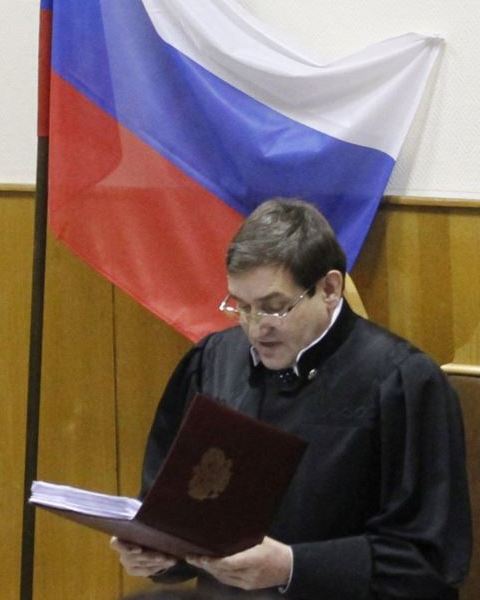
Judge Viktor Danilkin reads the verdict
Natalya Vasilyeva, the assistant of judge Danilkin, testified on February 14, 2011, that the judge had prepared his verdict to be delivered on December 16, 2010. On December 15, however, the deliverance was postponed for unknown reasons to December 27. On December 16, it became clear why. That day, Putin delivered a controversial speech in which he said that Khodorkovsky was a thief and therefore should be stay in prison. Vasilyeva testified that the original judgment of Danilkin had been changed and that he had delivered the new verdict against his will. As a result of this adjusted verdict, Khodorkovsky and Lebedev could not be released before August 2014.
In 2011, the then Russian President Dmitry Anatolyevich Medvedev (°1965) asked the Kremlin Human Rights Council to investigate the Khodorkovsky case further. The Council concluded that Khodorkovsky and Lebedev were innocent. It did not lead to a release, though. On the contrary, the nine members of the Council were accused of being bribed. Five of them were the subject of interrogations and prosecutions. Some lost their jobs or had to move abroad. In addition, a third case against Khodorkovsky and Lebedev was being prepared.
In the run up to the Olympic Winter Games of 2014 in Sochi, a project in which Putin wanted to shine in the eyes of the world, many world leaders had announced that they would not attend the ceremonies. Real reasons were not given, but it was clear that the way in which human rights were violated in Russia was at the basis of it. Especially the arrest of 30 Greenpeace activists a few months earlier, the Khodorkovsky case and the Russian anti gay law were an eyesore. On December 17, 2013, U.S. President Barack Obama said he would not come himself to Sochi. As members of the delegation which would represent him, he appointed two notorious gay people: tennis legend Billie Jean King (°1943) and hockey player Caitlin Cahow (°1985). According to the American-Russian journalist Masha Gessen, Putin loomed for the specter to see himself accompanied by «only the Ukrainian president and two American gays» at the opening of his personal prestige project. On December 19, 2013, Putin unexpectedly announced that Mikhail Khodorkovsky could be released, which happened the next day. On December 20, 2013, Khodorkovsky arrived as a free man in Berlin. According to Putin, he can freely return to Russia, but whether that will ever happen is doubtful, as the investigations for a possible third trial have not been put on hold.
On July 28, 2014 Russia was condemned by the Permanent Court of Arbitration in The Hague for the way Mikhail Khodorkovsky, Platon Lebedev and Yukos were treated. Besides the fact that Russia was sentenced to a very severe damages of 50 billion USD, the Court was also very hard in its motivation. The dismantling of Yukos was politically motivated, with the aim to push the company towards bankruptcy to take its assets and transfer them to state owned enterprises and to silence politically the CEO of the company, Mikhail Khodorkovsky.
It is the largest ever compensation awarded by the Court in The Hague: it is 20 times larger than the second largest, and does not even take into account complaints from minority shareholders whose files have yet to be examined.
The consequences for Russia are huge: the sum is 11 % of the country's national currency reserves and 10 % of the government budget. Also, there will be consequences for Rosneft, the energy giant which got most of Yukos' assets, and of which the British company BP became a minority shareholder. The Russians had to show the money before January 2, 2015. Since they didn't, interests started running. Although Russia can not appeal against the verdict, the Kremlin said they will try to use «all means to undo it». According to the 1958 Arbitration Convention, Russia is now risking the seizure of all Russian assets in 150 countries to execute the sentence.
In Putin's entourage, no one is in the least concerned. One of the people from his inner circle told the Financial Times that the verdict was unimportant in the light of the geopolitical issues with Ukraine: «There will be war in Europe. Do you really think that this case is of any importance?»
On September 20, 2014, Mikhail Khodorkovsky relaunched Open Russia during an online conference. The organisation aims to bring together citizens living both inside and outside of Russia, who share the European values of a strong, dynamic, and forward-looking state founded upon effective democratic institutions and the rule of law.
In 2008, Mikhail Khodorkovsky had a correspondence from his cell with the famed Russian novelist Lyudmila Ulitskaya. In candid and revealing letters, Khodorkovsky discussed his life in prison, how he maintained his strength and his life as an oligarch. Your webmaster translated their letters in English, French and Dutch. You can read them following the link below.
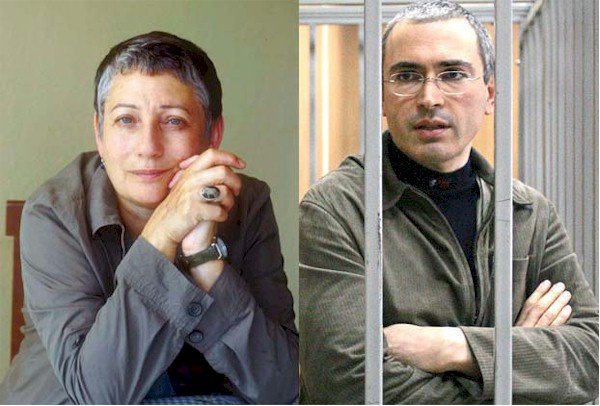
Lyudmila Ulitskaya and Mikhail Khodorkovsky
Aleksey Navalny
Another opponent of Vladimir Putin, the famous blogger Alexey Anatolievich Navalny (1976-2024), was also skillfully eliminated. Navalny, who was named Person of the Year by the Russian business newspaper Vedomosti in 2009, was known for his blogs and some initiatives of civil emancipation. One of his strategies, for example, existed in becoming minority shareholder in several major Russian state-owned enterprises. As a shareholder, he hoped to get information which would enable him to make the financial assets and the financial structure of these companies more transparent. Navalny was arrested and sentenced several times to a couple of weeks in prison for participating in demonstrations.
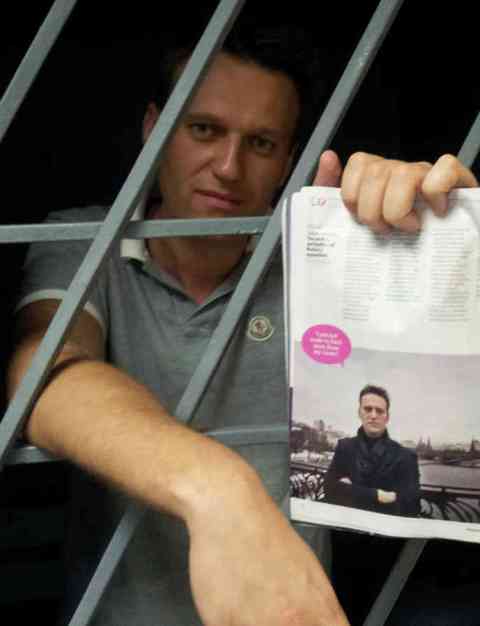
Alexey Anatolievich Navalny
On July 10, 2013, when he was going to register as a candidate for mayor of the city of Moscow, Navalny was arrested under the eyes of many spectators and the press. On July 17, his candidacy was formally accepted. The next day however, on July 18, 2013, he was sentenced to five years of prison camp on a trial in the city of Krilov. The indictment was even absuder than in the case of Khodorkovsky and Lebedev. According to the judge, Navalny would have sold 10.000 cubic meters of wood of the state owned company KirovLes far under its value when he was an adviser to Nikita Yurevich Belych (°1975), the governor of the Kirov oblast in 2009. By doing so, he would have pinched 400,000 euros. The verdict of the court corresponded word for word to the accusation of the prosecutor, except for the punishment. The prosecutor had demanded six years in a labour camp.
On the evening of the verdict, thousands of people gathered in the streets of Moscow and other large cities in Russia, despite the formal ban on demonstrations. Due to those meetings, and also perhaps as a result of international pressure, a surprising news came out of the blue the next day, on July 19, 2013: on the initiative of the prosecutor, Navalny was released on bail. He was free again to await the appeal decision.
It is suggested that, with the release, the Russian government wanted to offer Navalny a last opportunity to escape. Journalist and human rights activist Alexandr Pinkhosovich Podrabinek (°1953), co-signatory of the so-called Prague Declaration, suggested on the website of the Institute of Modern Russia that the authorities have missed the moment that Navalny could be murdered without publicity. The Kremlin would like to see him emigrate. They would therefore like that he tried to escape from the court by seeking political asylum somewhere, in which case he could not return to Russia unpunished.
In February 2014, Alexey Navalny and his brother Oleg Anatolievich (°1984) were prosecuted on embezzlement and money laundering charges following a complaint by Bruno Leproux, general director of the Russian subsidiary of the French cosmetics and beauty brand Yves Rocher. The prosecution claimed they had embezzled over 26,7 million rubles or 540,000 USD from the Russian subsidiary Yves Rocher Vostok between 2008 and 2012. Despite the fact that Yves Rocher France denied that they had any losses, Navalny was placed under house arrest on February 28, 2014, and prohibited from communicating with anyone other than his family, after allegedly violating travel restrictions.
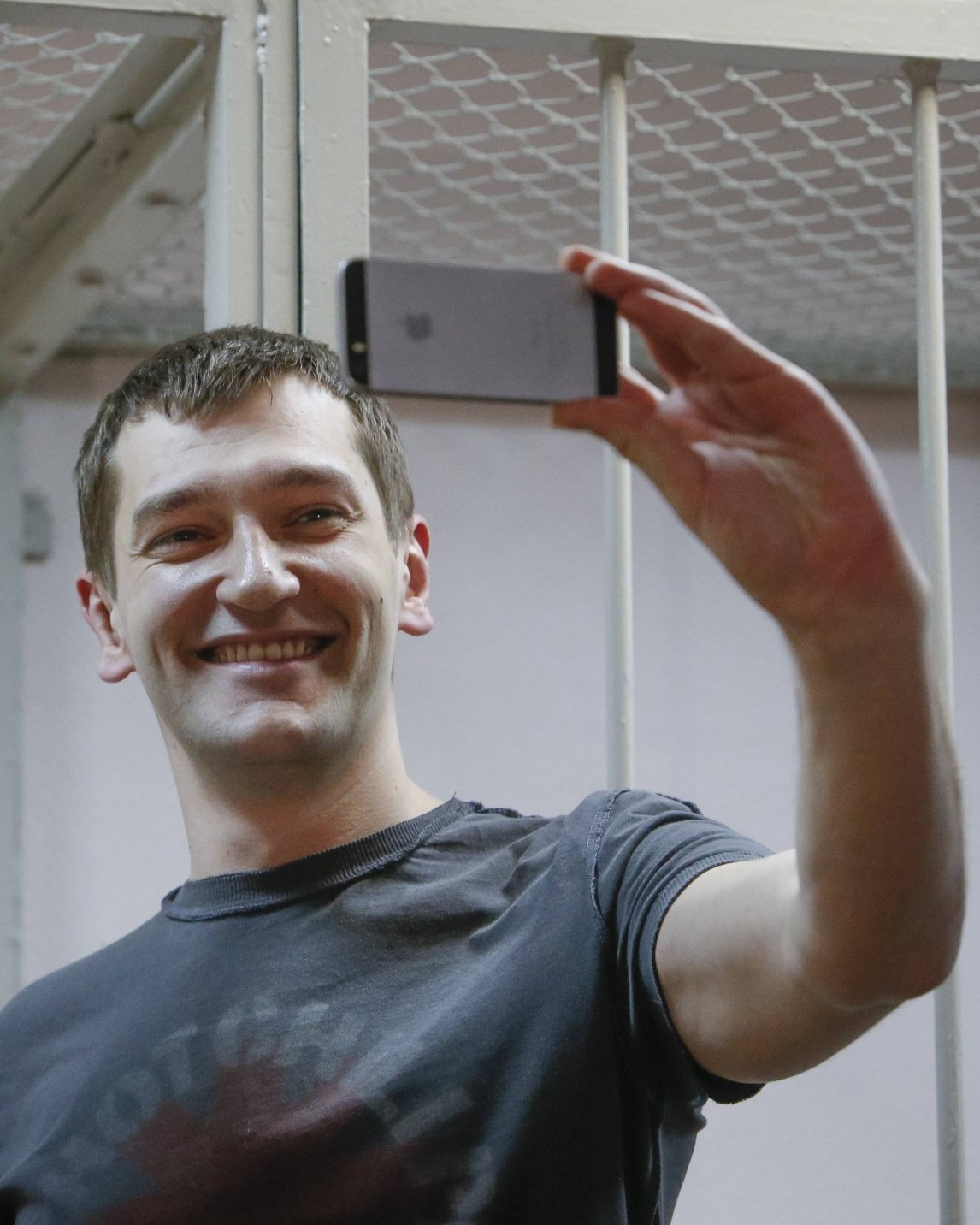
Oleg Anatolievich Navalny
Then followed two surprising events. First, the sentence was scheduled originally to be read on January 15, 2015. Sympathisers had planned demonstrations in many cities on that day. Not only in Russia, but in many cities in Europe and the United States, Navalny supporters had planned actions at the doors of shops and offices of Yves Rocher, but on December 29, 2014, the judge suddenly announced that she was to read the sentence the next day, on December 30, 2014. The second surprise was that Alexei Navalny got only 3,5 years of suspended sentence, whereas his brother Oleg was sentenced to 3,5 years in prison and was arrested after the sentence was read. It looks like, by punishing Alexey's brother harder, the Russian authorities wanted to put additional psychological pressure on the Navalny family in another attempt to silence them.
But Navalny did not remain silent, and he was further harassed. In 2018, he became partially blind in one eye after a chemical was thrown in his face.In July 2019, while in prison following a conviction for incitement to protest, he was admitted to a hospital in Moscow due to a poisoning.
On August 20, 2020, Navalny, en route from Tomsk to Moscow by plane, had to be taken again to the intensive care unit of a hospital in Omsk. The incident caused international commotion and raised questions from government leaders such as German Chancellor Angela Merkel and French President Emmanuel Macron. After the hospital in Omsk initially noticed no symptoms of poisoning and refused to let him go to Germany for further treatment, he was transferred to Berlin on August 22. There, the doctors discovered that he had been poisoned with novichok, a nerve poison developed by the Soviet Union at the time. It would be much stronger than other nerve toxins such as sarin and would be more difficult to combat with atropine. It is a very deadly weapon that is certainly not available everywhere and that brings the suspicion very much to the Russian government.
In 2018, the Russian secret agent Sergey Skripal and his daughter Julia were also - along with some British citizens - poisoned with novichok in the city of Salisbury in the United Kingdom. Skripal was ill for a long time, but survived, but a British police officer has died.
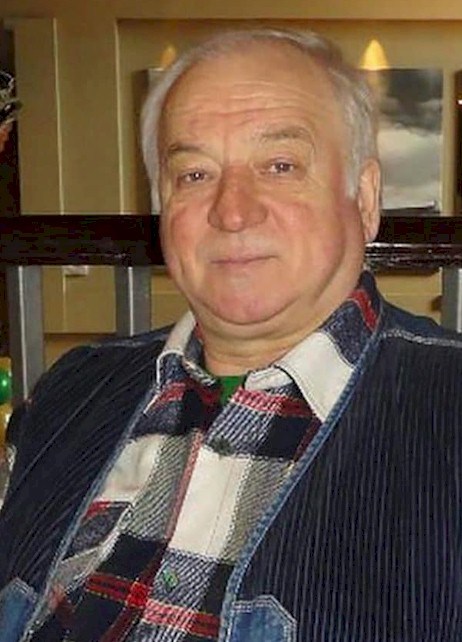
Sergey Skripal
This attack is attributed by the British to Alexander Petrov and Ruslan Borshirov, two agents of the Russian military intelligence service GRU who had been in Salisbury. On a video afterwards, the men did not deny this, but said they wanted «to visit Salisbury Cathedral as a tourist».
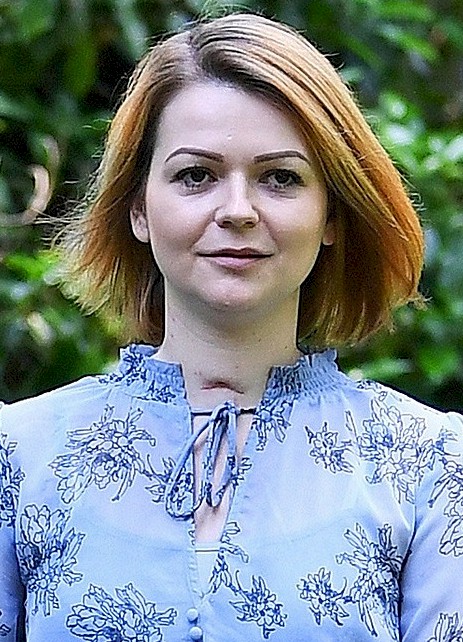
Julia Skripal
Sergey Magnitsky
If you thought this was the most absurd example, then you are wrong. On July 11, 2013, the District Court of Tver sentenced Sergey Leonidovich Magnitsky (1972-2009) for embezzling 230 million USD. Macabre detail: Magnitsky was already dead since three and a half years. On November 16, 2009, he died in a cell of the Butyrka prison in Moscow. He was already eleven months in prison without trial, and should therefore have been released eight days later, according to the Russian law.
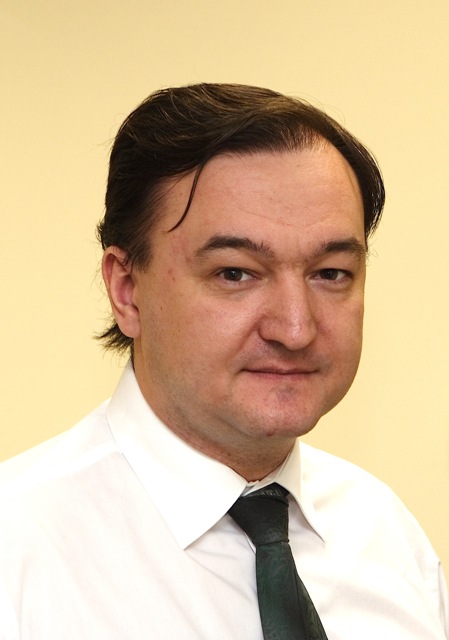
Sergey Leonidovich Magnitsky
Sergey Magnitsky was a lawyer who worked on behalf of Bill Browder (°1964), the American owner of Hermitage Capital Management, an investment fund in London, specialised in the Russian market. Magnitsky had discovered that, under the care of the Russian Interior Minister and some senior tax officials, a system was set up by which 230 million USD had been stolen from the company.
On June 4, 2007, 20 tax officials searched the Moscow office of Browder, and the documents they took were used to change the company ownership and turn it into a heavily loss-making business. The«new owner» turned out to be Viktor Aleksandrovich Markelov (°1967), a convicted murderer who had been released two years earlier. Shortly after this raid, the company had made so many losses that it was entitled to a tax refund of 230 million USD. On December 24, 2007, this amount was repaid... to the «new owner».
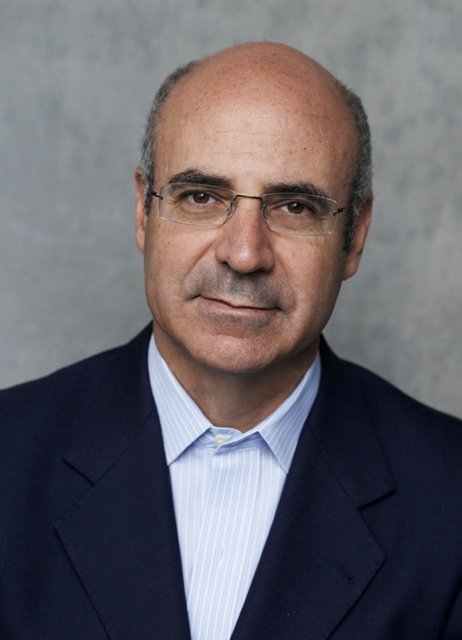
Bill Browder
Browder contacted the Russian government with the findings of Magnitsky, and demanded that the money would be returned, not to Hermitage, but to the Russian people, and that the guilty ones would be prosecuted. The Russian government started a prosecution, albeit not against the police officers and officials who were involved in the theft. Instead, Magnitsky was accused of embezzling 17 million USD, and Browder could no longer access the Russian Federation.
Sergey Magnitsky was transferred to the Butyrka prison, one of the most notorious detention centers in Russia. He was regularly denied medical care.
An official inquiry committee, which was commissioned by president Dmitry Medvedev, would show in July 2011 that the indictment of the prosecutor against Magnitsky was a fabrication. The committee also revealed that his death was due to the denial of medical care, and they even found evidence of torture.
Bill Browder then began to lobby in the United States, and with success. On December 14, 2012, President Barack Obama signed the Magnitsky Act This law forbade all those responsible for the death of Magnitsky access to the United States and the use of the U.S. banking system.
The Russian government responded in turn. On December 28, 2012, the Tver District Court ruled that the doctors involved at the Butyrka prison could not be imputed, and the dead Magnitsky was taken to court. He was found guilty. When Magnitsky's lawyers said that they would appeal, the Russian government responded with the laconic statement that «dead people can not appeal». It was not explained, however how dead people can be convicted.
Come back, Mikhail Bulgakov
The Navalny and Magnitsky cases caused reactions, not only in Russia but also worldwide. On July 20, 2013, Denis MacShane, the former Minister of European Affairs of the United Kingdom, wrote: «Where are you Mikhail Bulgakov when we need you?»
Kirill Serebrennikov
On August 22, 2017, Kirill Semyonovich Serebrennikov (°1969), one of the most famous Russian film and theater directors, was arrested.
Serebrennikov is the managing director of the Gogol Center, a progressive experimental theater which is popular among liberals in Moscow. It is known for contemporary productions that are often directly related to political or sexual themes rarely displayed on stage in Moscow.
However, the charges are not about Serebrennikov's political or moral views, but - you could already guess - about embezzlement. It would be about more than 68 million rubles, 975,000 euros or 1,15 million dollars. Serebrennikov would have, among others, misappropriated the 2,3 million rubles (32.999 euros or 39.359 dollar) of subsidies he received from 2011 to 2014 for the production of William Shakespeare's A Midsummer Night's Dream by his company Studio Seven. The Public Attorney said the piece has even never been staged. An absurd statement because, in reality, the play has been represented quite a few times, not only in Russia, but also in theatres abroad, among which the Théâtre National de Chaillot in Paris and the Théâtre des Martyrs in Brussels. It got considerable attention in the press - both pro and contra -, and has even been nominated for theater prizes. When confronted with this finding, judge Tatyana Vasyuchenko of the Presnensky Court of Moscow replied laconically: «The publication of an article does not prove that the event really has taken place».
Serebrennikov had already had a difficult year 2017. In May, he was heard «as a witness in a fraud case», after the arrest of producer Alexey Malobrodsky and bookkeeper Nina Maslyjaeva, both former staff of Studio Seven. Maslyaeva would have provided «proof of the involvement of Serebrennikov» during the interrogations.
Afterwards, the representations of a ballet about the famous dancer Rudolf Nureev (1938-1993), which were scheduled for the month of July at the Bolshoy Theatre, were canceled three days before the planned premiere. According to director Vladimir Urin, the production was «not ready yet», but insiders reported that he was put under pressure to delete the ballet because the homosexual relations of Nureev were openly shown in it.
The judge decided to place Serebrennikov under house arrest until October 19, 2017. In a possible trial, he is risking a 10-year jail sentence.
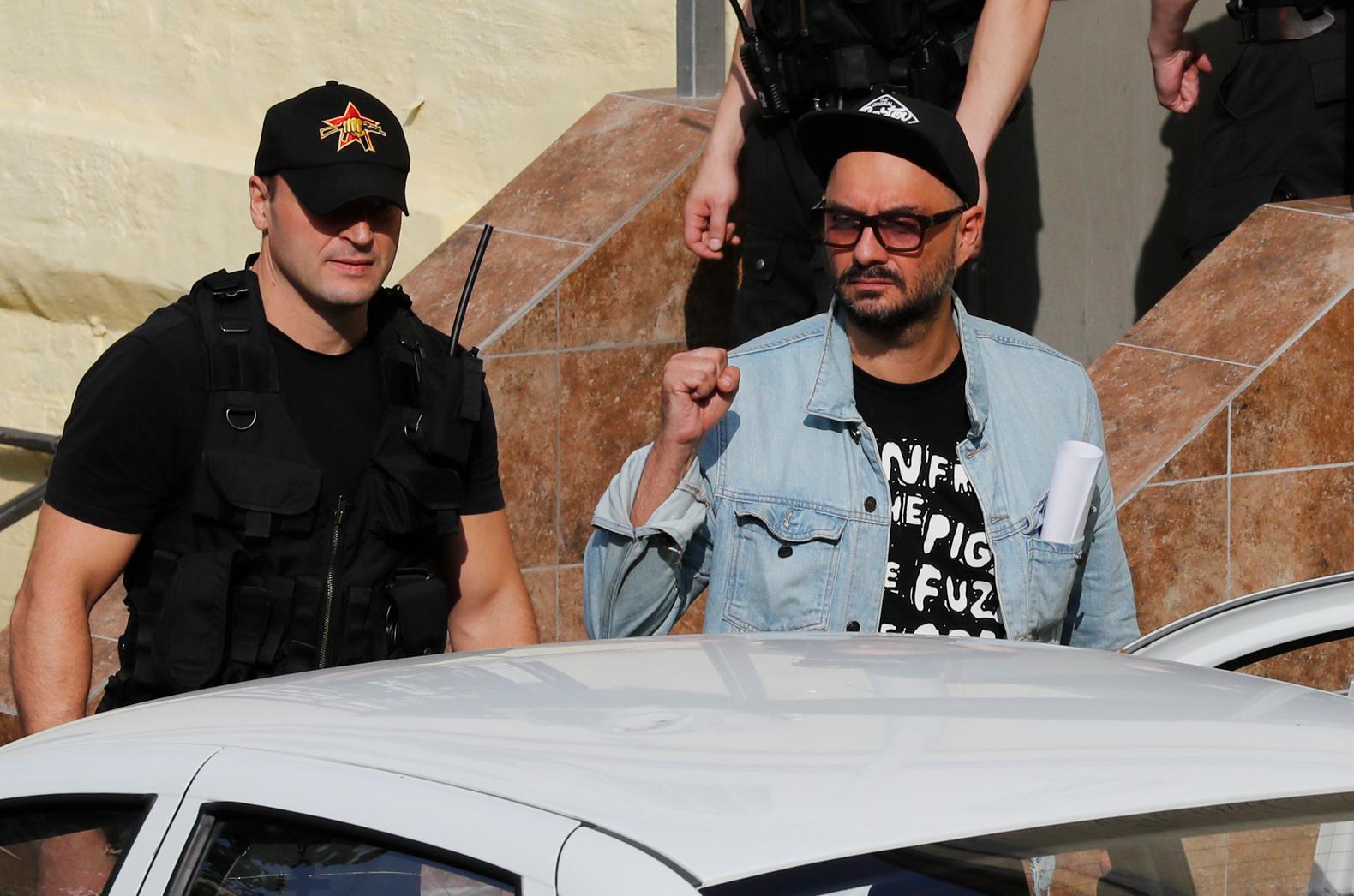
The arrest of Kirill Serebrennikov
Some are allowed to embezzle money
On March 29, 2001 at 22:00, the police arrested a man and a woman who had tried to cross the border with Switzerland at the customs post of Bietingen near Gottmadingen, Germany. They carried a handbag and a briefcase with documents and computer disks. The woman was Tamara Rudich (°1959), a molecular biologist. The man was Oleg Lototsky (°1962), a friend and business associate of Miss Rudich. They said they were on a business trip to Zurich. The customs post of Bietingen is not on the normal routes to Switzerland, there are rarely individuals coming along.
The documents they were carrying showed transactions worth 5 billion USD on account of six banks, including Credit Suisse, Deutsche Bank, ABN AMRO Bank and the Bank of Cyprus. The report submitted by customs to the Central Office against financial crime in Baden-Württemberg, stated that the authorised signatory was Vladimir Vladimirovich Putin, President of the Russian Federation.
As far as we know, Vladimir Vladimirovich Putin was not questioned about this incident and is still a free man.
Not only trials
Quite some opponents of the regime of Vladimir Putin were not brought to court, but immediately killed. Especially journalists who wrote articles critical of the regime, were often brutally murdered. Not less than 144 journalist have been killed between 1999, the year in which Putin started his first presidency, and 2014.
Anna Politkovskaya
Anna Stepanovna Politkovskaya (1958-2006) was one of the few independant journalists in Russia and wrote for the Novaya Gazeta, the only newspaper daring to be critical, and she published some books of which Dirty War is well known. She was often threatened. A Russian army officer was impeached for it in 2003, but he was discharged. On October 7, 2006 she was found dead in an elevator of her apartment in Moscow, she appeared to be shot. The murderer had left the weapon, a revolver with bullits, in the elevator.
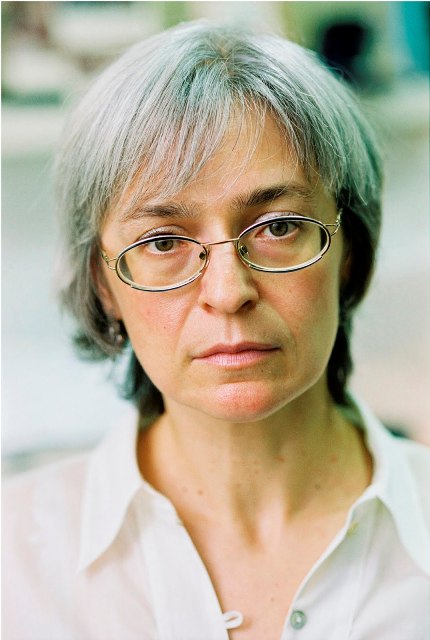
Anna Stepanovna Politkovskaya
In February 2009, three suspects of the murder were brought to justice: Sergey Khadzhikurbanov, a former officer of the Moscow Police Directorate against Organized Crime, and two Chechen brothers Ibrahim Makhmudov and Dzhabrail Makhmudov. A third brother, Rustam Makhmudov, who would have fired the gun, could not be arrested because he was hiding in Belgium. The three accused were acquitted by a jury. After public protests, mainly from western countries, the Russian Supreme Court ordered a new trial. In the spring of 2011, a delegation of Russian investigators was sent to Belgium, where Rustam Makhmudov and his uncle Lom-Ali Gaitukaev were interrogated in the prisons of Dendermonde and Liège and handed over to the Russian authorities.
On December 14, 2012, Dmitry Pavlyuchenko, another former police officer, was sentenced to 11 years of penal colony for his involvement in the murder of Politkovskaya. At the time of the murder, Pavlyuchenko was lieutenant-colonel of the Fourth Division of the Moscow Police Search Unit. He told the investigators that the murder had been organised by Lom-Ali Gaitukaev, on demand of businessman Boris Abramovich Berezovsky (1946-2013). It would specifically have been asked to commit the murder on 7 October, the birthday of Vladimir Vladimirovich Putin (°1952). Gaitukaev would have been commissioned in July 2006, and would then have asked Pavlyuchenko, Khadzhikurbanov and his three cousins to carry it out. But Aleksandr Bastrykin, head of the Investigation Commission, declared that there is no evidence for the involvement of Berezovsky.
Berezovsky, businessman and friend of former Russian President Boris Yeltsin (1931-2007), was convicted in Russia in absentia for embezzlement, fraud and money laundering, and lived in self-imposed exile in the United Kingdom since 2001. He got a refugee status in London and a passport in which he changed his name to Platon Elenin. He remained a staunch critic of Vladimir Putin, and was found dead in his apartment on March 23, 2013, with a noose around the neck.
On May 20, 2014 the three brothers Makhmudov, their uncle Lom-Ali Gaitukaev and Sergey Khadzhikurbanov were eventually found guilty by a jury in Moscow. On June 9, 2014, Lom-Ali Gaitukaev and Rustam Makhmudov were sentenced to life. Sergey Khadzhikurbanov was given 20 years, while the two other Makhmudov brothers were sentenced to 12 and 14 years as accomplices. The five exchanged smiles in their glass-fronted courtroom cage before they all received long sentences.
Vladimir Markin, the spokesman of the Investigative Committee said that the authorities are still looking for the real mastermind behind the murder. «Exhaustive measures are being taken at this time to find the killing’s initiator», he said.
Boris Nemtsov
Another opponent of the regime who’s life was violently ended was Boris Yefimovich Nemtsov (1959-2015).
Nemtsov entered politics during the failed coup against former Soviet leader Mikhail Sergeevich Gorbachev (°1931) in August 1991. He organised the protest of citizens against insurgent soldiers in the defense of the parliament building. The coup failed and Nemtsov was noticed and included in the staff of former Russian President Boris Nikolaevich Yeltsin (1931-2007). As a governor of his home city of Nizhny Novgorod, and from 1997 as Deputy Prime Minister and Minister of Energy, he played a major role in the privatisation of former communist state enterprises
In 1998, he had to resign and he founded the liberal party Union of Right Forces. He was a leader of the liberal opposition to President Vladimir Putin. In 2004, he supported the Orange Revolution in Ukraine and he was economic adviser to the former Ukrainian President Viktor Andriyovych Yushchenko (°1953), whose face got severely disfigured as a result of a dioxin poisoning during the election campaign.
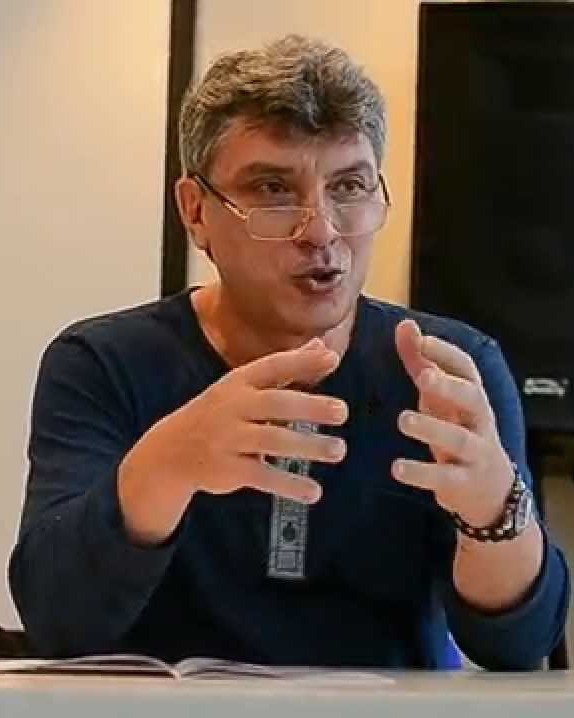
Boris Yefimovich Nemtsov
Boris Nemtsov was shot in central Moscow on Friday, February 27, 2015. He was 55 years old. An unidentified gunman shot him four times in the back when he was walking across the Bolshoy Moskvoretsky Most, a bridge at less than 100 meters from the Kremlin. He died a few hours after he had made a call to protest against the war in Ukraine in a mass demonstration on the next Sunday. A few days before the murder he had said in an interview that he feared that the president wanted him dead for his opposition to the war. The place where the murder was committed, and where your webmaster passed daily when he was living in Moscow, is infested with CCTV cameras. Therefore, there must be images of what happened. It was striking that the Russian Interior Minister Vladimir Alexandrovich Kolokoltsev (°1961), arrived immediately after the events at the crime scene to «supervise the investigation personally».
In 2013, Mentsov published Winter Olympics in the Sub-Tropics, a report on the corruption and abuse involved in the organisation of the 2014 Winter Olympics in Sochi. The former President of Georgia, Mikheil Saakashvili, (°1967) told CNN that Nemtsov was now working on a report about the Russian involvement in the conflict with Ukraine. «He prepared an announcement on Ukraine,» Saakashvili said. «He wanted to tell the Russian public what is going on there.» This may have been fatal to Nemtsov. Journalist and Human Rights activist Aleksandr Ryklin, a friend of his said: «Anyone who stands up for Ukraine these days s seen as a traitor by the Russian media. An atmosphere is created in which everyone who disagrees with Putin is a traitor. This is certainly true when it comes to Ukraine. »
Russia officially denies that its soldiers are fighting in Ukraine. In reality, Russian soldiers are killed every day in this «undeclared war». Their bodies are returned to Russia in trucks as Груз 200 [Gruz 200] or Cargo 200, the code name used in Russia for dead bodies as they are transported from the battlefield. Nemtsov was shot down in Moscow shortly after he had announced that he would publish a detailed report about the Russian involvement in Ukraine under the title Путин. Война. [Putin. Voyna] or Putin. War. After Nemtsov's death, some of his colleagues completed his report and published it on the Internet.
You can download Boris Mentsov's report from this website using the following link [ru].
According to British Defense Secretary Ben Wallace, Russia has «solved» the problem of the Cargo 200 in its own way. The country now has mobile crematoriums that can follow invading forces and «evaporate» dead soldiers. The British Ministry of Defense released a video of the trucks that can incinerate bodies one at a time and suggested on February 23, 2022, that the Kremlin might deploy them in its war with Ukraine in to hide the number of casualties.
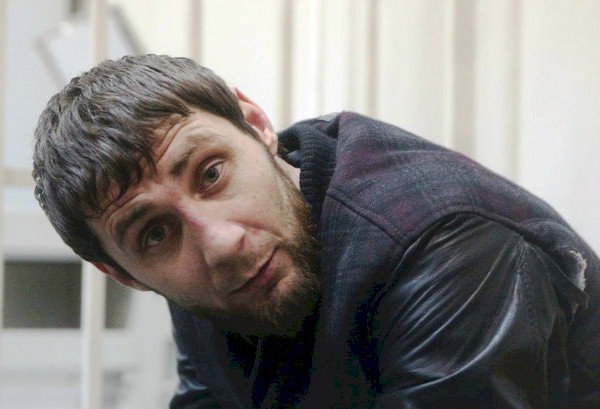
Zaur Dadaev
On June 29, 2017, the Chechen ex-serviceman Zaur Dadaev was sentenced to 20 years in prison for the murder of Nemtsov. He was arrested along with four companions who got sentences between 11 and 19 years in prison. Nemtsov's family is convinced that the five are not the real perpetrators, but only pawns of the real mastermind behind the attack: the Chechen leader Ramzan Kadyrov (°1976). Kadyrov called Dadaev «one of the bravest fighters he has ever known.
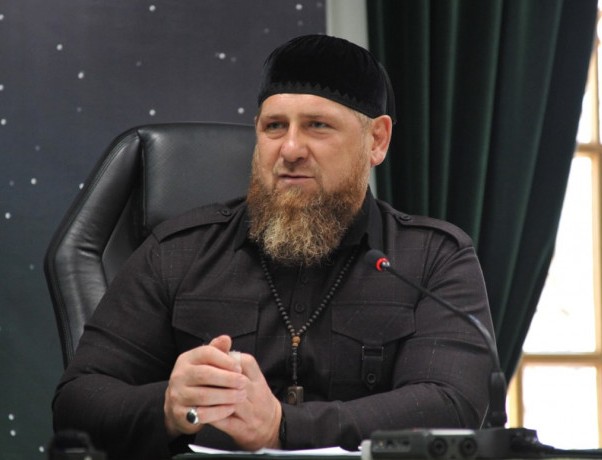
Ramzan Kadyrov







